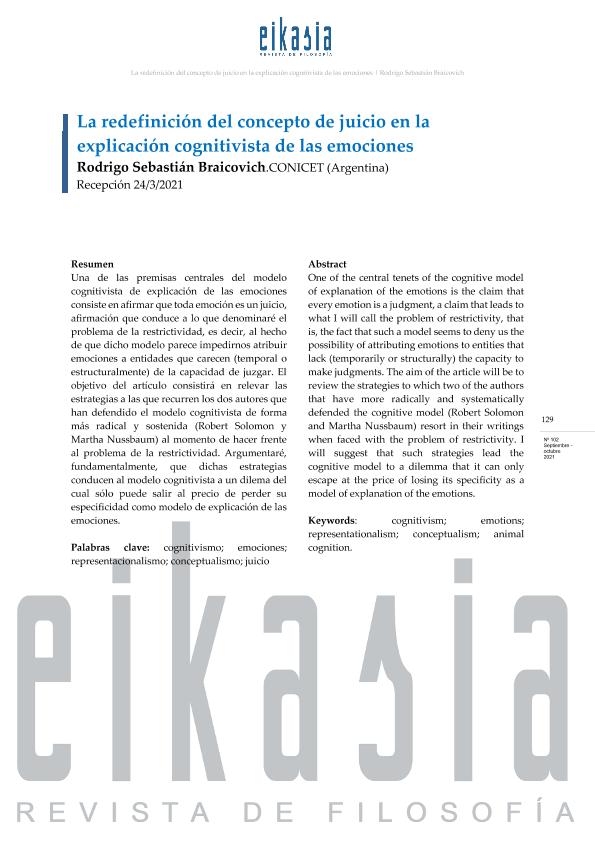Mostrar el registro sencillo del ítem
dc.contributor.author
Braicovich, Rodrigo Sebastián

dc.date.available
2022-07-08T10:20:56Z
dc.date.issued
2021-09
dc.identifier.citation
Braicovich, Rodrigo Sebastián; La redefinición del concepto de juicio en la explicación cognitivista de las emociones; Eikasia Ediciones; Eikasia; 102; 9-2021; 129-151
dc.identifier.issn
1885-5679
dc.identifier.uri
http://hdl.handle.net/11336/161652
dc.description.abstract
Una de las premisas centrales del modelo cognitivista de explicación de las emociones consiste en afirmar que toda emoción es un juicio, afirmación que conduce a lo que denominaré el problema de la restrictividad, es decir, al hecho de que dicho modelo parece impedirnos atribuir emociones a entidades que carecen (temporal o estructuralmente) de la capacidad de juzgar. El objetivo del artículo consistirá en relevar las estrategias a las que recurren los dos autores que han defendido el modelo cognitivista de forma más radical y sostenida (Robert Solomon y Martha Nussbaum) al momento de hacer frente al problema de la restrictividad. Argumentaré, fundamentalmente, que dichas estrategias conducen al modelo cognitivista a un dilema del cual sólo puede salir al precio de perder su especificidad como modelo de explicación de las emociones.
dc.description.abstract
One of the central tenets of the cognitive model of explanation of the emotions is the claim that every emotion is a judgment, a claim that leads to what I will call the problem of restrictivity, that is, the fact that such a model seems to deny us the possibility of attributing emotions to entities that lack (temporarily or structurally) the capacity to make judgments. The aim of the article will be to review the strategies to which two of the authors that have more radically and systematically defended the cognitive model (Robert Solomon and Martha Nussbaum) resort in their writings when faced with the problem of restrictivity. I will suggest that such strategies lead the cognitive model to a dilemma that it can only escape at the price of losing its specificity as a model of explanation of the emotions.
dc.format
application/pdf
dc.language.iso
spa
dc.publisher
Eikasia Ediciones
dc.rights
info:eu-repo/semantics/openAccess
dc.rights.uri
https://creativecommons.org/licenses/by-nc-sa/2.5/ar/
dc.subject
COGNITIVISMO
dc.subject
EMOCIONES
dc.subject
REPRESENTACIONALISMO
dc.subject
CONCEPTUALISMO
dc.subject
JUICIO
dc.subject
COGNITIVISMO
dc.subject
EMOTIONS
dc.subject
REPRESENTATIONALISM
dc.subject
CONCEPTUALISM
dc.subject
ANIMAL COGNITION
dc.subject.classification
Otras Filosofía, Étnica y Religión

dc.subject.classification
Filosofía, Ética y Religión

dc.subject.classification
HUMANIDADES

dc.title
La redefinición del concepto de juicio en la explicación cognitivista de las emociones
dc.type
info:eu-repo/semantics/article
dc.type
info:ar-repo/semantics/artículo
dc.type
info:eu-repo/semantics/publishedVersion
dc.date.updated
2021-12-03T21:10:54Z
dc.journal.number
102
dc.journal.pagination
129-151
dc.journal.pais
España

dc.journal.ciudad
Oviedo
dc.description.fil
Fil: Braicovich, Rodrigo Sebastián. Universidad Nacional de Rosario. Facultad de Humanidades y Artes. Instituto de Estudios Críticos en Humanidades. Consejo Nacional de Investigaciones Científicas y Técnicas. Centro Científico Tecnológico Conicet - Rosario. Instituto de Estudios Críticos en Humanidades; Argentina
dc.journal.title
Eikasia
dc.relation.alternativeid
info:eu-repo/semantics/altIdentifier/url/https://www.revistadefilosofia.org/102/102-07.pdf
Archivos asociados
